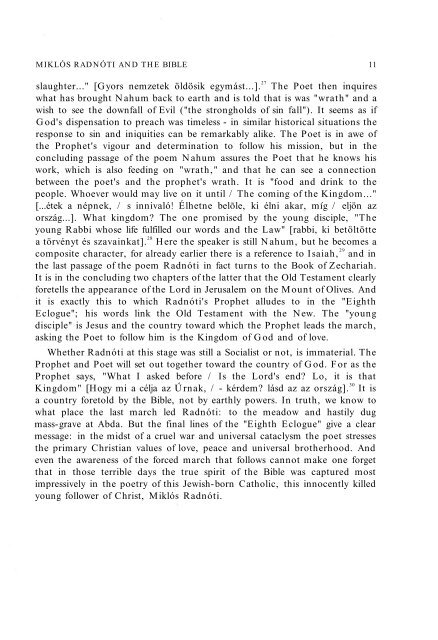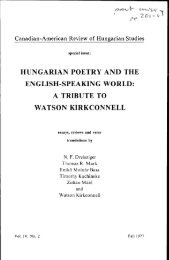HUNGARIAN STUDIES 11. No. 1. Nemzetközi Magyar ... - EPA
HUNGARIAN STUDIES 11. No. 1. Nemzetközi Magyar ... - EPA
HUNGARIAN STUDIES 11. No. 1. Nemzetközi Magyar ... - EPA
- No tags were found...
You also want an ePaper? Increase the reach of your titles
YUMPU automatically turns print PDFs into web optimized ePapers that Google loves.
MIKLÓS RADNÓTI AND THE BIBLE 11slaughter..." [Gyors nemzetek öldösik egymást...]. 27The Poet then inquireswhat has brought Nahum back to earth and is told that is was "wrath" and awish to see the downfall of Evil ("the strongholds of sin fall"). It seems as ifGod's dispensation to preach was timeless - in similar historical situations theresponse to sin and iniquities can be remarkably alike. The Poet is in awe ofthe Prophet's vigour and determination to follow his mission, but in theconcluding passage of the poem Nahum assures the Poet that he knows hiswork, which is also feeding on "wrath," and that he can see a connectionbetween the poet's and the prophet's wrath. It is "food and drink to thepeople. Whoever would may live on it until / The coming of the Kingdom..."[...étek a népnek, / s innivaló! Élhetne belőle, ki élni akar, míg / eljön azország...]. What kingdom? The one promised by the young disciple, "Theyoung Rabbi whose life fulfilled our words and the Law" [rabbi, ki betöltöttea törvényt és szavainkat]. 28 Here the speaker is still Nahum, but he becomes acomposite character, for already earlier there is a reference to Isaiah, 29 and inthe last passage of the poem Radnóti in fact turns to the Book of Zechariah.It is in the concluding two chapters of the latter that the Old Testament clearlyforetells the appearance of the Lord in Jerusalem on the Mount of Olives. Andit is exactly this to which Radnóti's Prophet alludes to in the "EighthEclogue"; his words link the Old Testament with the New. The "youngdisciple" is Jesus and the country toward which the Prophet leads the march,asking the Poet to follow him is the Kingdom of God and of love.Whether Radnóti at this stage was still a Socialist or not, is immaterial. TheProphet and Poet will set out together toward the country of God. For as theProphet says, "What I asked before / Is the Lord's end? Lo, it is thatKingdom" [Hogy mi a célja az Úrnak, / - kérdem? lásd az az ország]. 30It isa country foretold by the Bible, not by earthly powers. In truth, we know towhat place the last march led Radnóti: to the meadow and hastily dugmass-grave at Abda. But the final lines of the "Eighth Eclogue" give a clearmessage: in the midst of a cruel war and universal cataclysm the poet stressesthe primary Christian values of love, peace and universal brotherhood. Andeven the awareness of the forced march that follows cannot make one forgetthat in those terrible days the true spirit of the Bible was captured mostimpressively in the poetry of this Jewish-born Catholic, this innocently killedyoung follower of Christ, Miklós Radnóti.
















